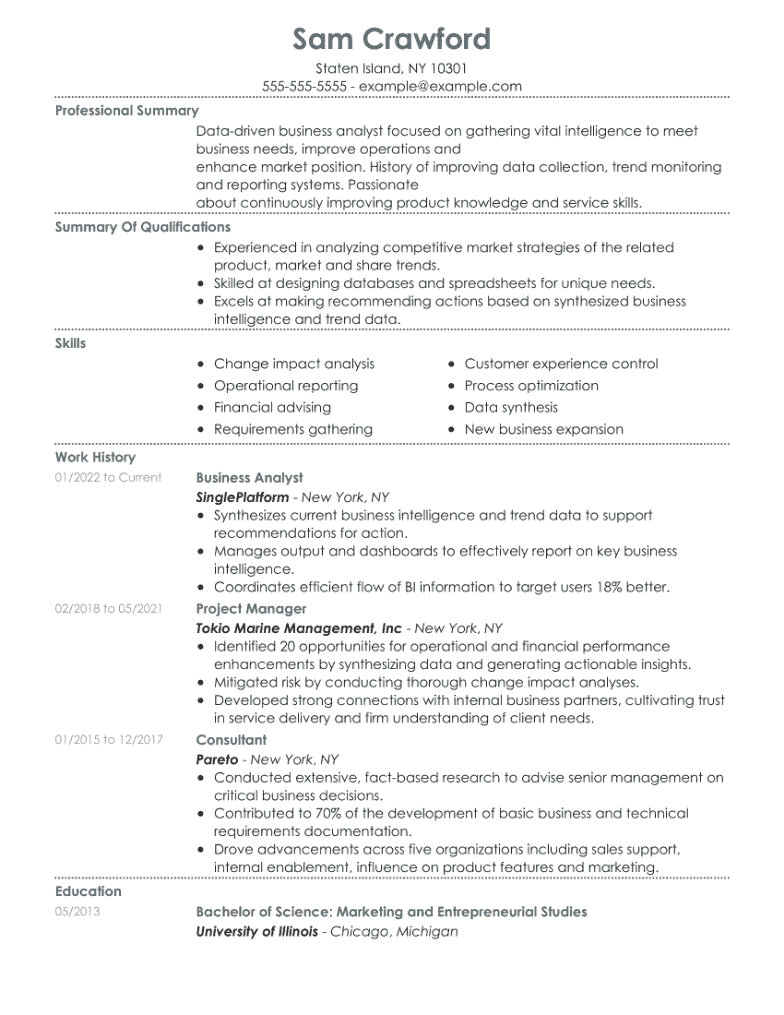How to write a business analyst CV that stands out
With an attention-grabbing business analyst CV, you will be one step closer to landing your dream job. Here are tips on how to do it.
With an attention-grabbing business analyst CV, you will be one step closer to landing your dream job. Here are tips on how to do it.





OUR USERS HAVE BEEN HIRED BY

Business analysts will remain in demand regardless of how technology or leadership practises change in the future. If you are going down this career path, here are several foolproof ways to boost your CV and get the attention of recruiters.
Business analysts collect and analyse data, recognise companies’ changing needs and find ways for businesses to improve their practices. Additionally, business analysts work with stakeholders and users to manage business projects and processes.
There are several types of business analyst positions, including business systems analysts, information technology business analysts, business data analysts, senior business analysts and more. No matter what position you’re applying for, here are some ideas to get you started on your business analyst CV.
For any CV you’re writing, you’ll want to include a skills section with both hard and soft skills. Some common soft skills necessary for a business analyst job include:
On the other hand, some hard skills to add to your CV include:
While writing your skills section, make sure to tailor your skills to match the keywords found in the job description. For example, if the hiring manager is looking for a candidate familiar with Agile and Waterfall methodologies, then make sure to include this in your skills section, if applicable.
To ensure your CV format stands out and is easy for potential employers to read, knowing what CV sections to add is important. Most CVs include a header, professional summary or career objective, a skills section, a work history section, an education section and any additional sections needed for certifications, achievements or notable awards.
To ensure your CV stands out against other applicants, focusing on your most relevant skills, job experience and certifications is important. If you have skills that don’t translate to the job you’re applying for, then you don’t have to include them on your CV. Additionally, include terminology that makes sense for the job position.
If you’re not sure how to format your CV, then check out some business analyst CV examples or CV templates to get started. Check out some of these formatting tips below to learn about the different CV sections.
In your CV header section, include your full name, job title and contact information, including your phone number, email address and a link to your LinkedIn profile. Ensure you leave an appropriate email address for a professional CV.
In your business analyst professional summary or career objective, give a brief overview of your career and skills, telling employers why you’re the best applicant for the job. Highlight your most notable achievements and showcase any awards or certifications that make you stand out against the rest.
The skills section should include brief bullet points highlighting your best soft and hard business analyst skills. As stated above, it’s important to tailor your CV skills to the skills and business requirements the employer is looking for, as listed on the job application.
Use a reverse-chronological format and list your most recent job first and work backwards to older jobs you’ve had. Include your job title, your place of work, years of experience and some major job responsibilities you held for that position.
For the education section of your CV, include the name of the college or university you attended, along with any degrees earned while attending.
If you’ve earned any recognition or awards during your time as a business analyst, then make sure to include these on your CV. If you have job-related certifications in important areas such as project management, they’re also useful to include in your CV.
Avoid adding job positions that are older than ten years old. More recent positions are generally more relevant to the position you’re applying for. Additionally, you shouldn’t add short-term or irrelevant jobs you’ve previously had. Potential employers want to see past job responsibilities and achievements that best showcase your abilities.
A well-written business analyst CV is significant because most hiring managers only spend a few seconds on each CV. By using an organised, easy-to-scan CV that’s tailored to the specific job by highlighting skills and abilities similar to what the job post requires, you have a greater chance of standing out.
If you need help getting started with your CV, look over the business analyst examples on this page. Use them as a foundation for your CV, adjusting each section to reflect your specific background and skills, matching them up with what the job needs.
We personalize your experience.
We use cookies in our website to ensure we give you the best experience, get to know our users and deliver better marketing. For this purpose, we may share the information collected with third parties. By clicking “Allow cookies” you give us your consent to use all cookies. If you prefer to manage your cookies click on the “Manage cookies” link below.